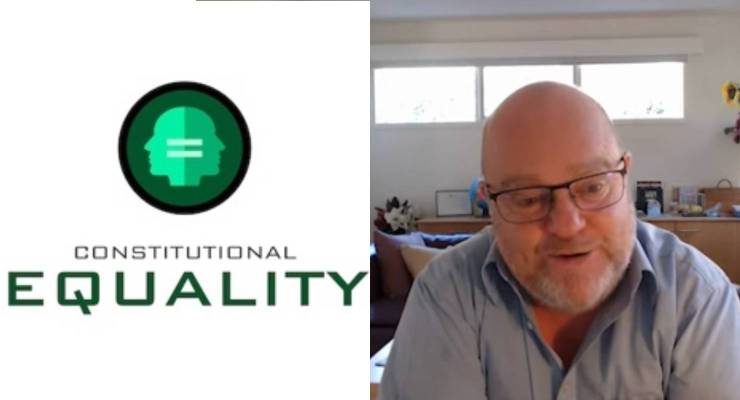
A serial Australian entrepreneur has bankrolled his own “educational” campaign against the Voice to Parliament, spending thousands of dollars on digital ads to defeat the referendum.
Constitutional Equality is an online campaign that describes itself as comprising “moderate non-politically aligned Australian citizens … concerned about the lack of information regarding the long-term impacts of enshrining a racially specific power in the constitution.”
Nestled in between quotes from Abraham Lincoln, Mahatma Gandhi and Martin Luther King Jr, the Constitutional Equality website includes arguments against the Voice, highlights “false” arguments in favour, and features essays and interviews with anti-Voice figures like The Australian’s legal affairs contributor Chris Merritt and Australian Catholic University honorary fellow Anthony Dillon.
According to Meta political advertising analysis tool PoliDashboard, Constitutional Equality’s anti-Voice Facebook and Instagram advertisements promoting its content have been shown more than 869,000 times to Australians this year at a cost of just under $17,000.
The campaign is authorised by Phillip Mobbs, who registered the campaign’s website under his company Learning International PTY LTD. Business and website records show that Mobbs has registered a slew of other companies including autism development program Life Concepts International and a more recent Cardano cryptocurrency venture Thriv Staking Pool.
Mobbs said that he started the campaign to get people to start thinking about the Voice to Parliament.
“I was initially a Yes voter, and then I started to research it with colleagues and over time we started to realise that this wasn’t going to be constructive for democracy in Australia,” he told Crikey over the phone.
Citing his own experiences backpacking through Malaysia, which he said has a “legislative environment that discriminates on race” that causes “racial unease”, Mobbs is concerned that a Voice to Parliament would bring the same problem here.
Registering the name late last year and launching online at the beginning of this year, Mobbs notes that Constitutional Equality predates Advance Australia’s No campaign, Fair Australia, although he speaks warmly of that campaign’s leaders.
“I believe that I should support Jacinta Price and Warren Mundine and those running the No campaign,” he said.
Mobbs is guarded about the particulars of his campaign. He won’t say how many people are involved, although he does admit that he hired an Australian company in the United States to help him set up Constitutional Equality’s digital presence. Nor will he say how many donations he’s received, how much he intends to tip in or what he expects the organisation to spend. Instead, he parries by claiming that the Yes campaign is much better resourced than the No campaign (Crikey reported earlier this week that the No campaign has outspent the Yes side in the past few months on online advertisements).
Mobbs believes that Constitutional Equality is striking a chord — ”growing into a community of people who’ve become social media influencers, reposting and creating content, contributing articles, donating money” — because it’s interested in the idea of how the whole Australian population works together rather than divided by race.
“[The Voice] won’t be good for Indigenous or Western people,” he said.








I’m sceptical about anyone’s experience of backpacking through Malaysia as a valid guide to how to approach the voice to parliament. The ethnic balance in Malaysia has little relevance to Australia’s indigenous population. It sounds like the ignorant comment of someone who’s visited a country for a few weeks and suddenly thinks he’s an expert on that country’s politics.
I’m sceptical about anyone’s experience of backpacking through Malaysia as a valid guide to how to order a meal………………..
Indeed. Quite the cliché.
“[The Voice] won’t be good for Indigenous .. people”, said the bald white guy, who obviously would know all about what’s best for Indigenous people.
It would not be a great surprise to find several of those alleged quotations are, at best, misattributed or else plain simple fabrications. The internet is awash with false or erroneous quotations, sometimes quoted in good faith, sometimes not.
Balding white IT guy against the voice. Seems legit.
My understanding is that Malaysia enshrined positive discrimination in its legislative framework, such that ‘affirmative action’ for bumiputras or native Malays became a mandatory legal requirement. I don’t know if that was intended to continue indefinitely but power, once given, is never gladly surrendered. Hence this so called positive discrimination in favour of bumiputras (synonymous with active discrimination against non-bumiputras) continues to this day.
The key word is power. Bumiputras in Malaysia were given power.
The Voice, on the other hand, gives no power. It simply recognises First Nations people and gives them a voice or a right to be heard, nothing more, not a power to veto or positively discriminate in favour of First Nations people.
Ideally, everyone who is disenfranchised should have a voice. However, the fact that there are say 10 disenfranchised groups and a voice is only being given to the first group in the queue seems fair to me.
First Nations people (and here, I am referring to people whose aboriginality cannot be questioned) have suffered and continue to suffer for many reasons including ingrained racism. If having a voice, that is, if having the hope of influencing their outcomes albeit not the power to actually change their outcomes, makes things more tolerable, then how can we deny this?
Thanks for pointing that out. The true first peoples of Malaysia – included in the bumiputras – are the Orang Asli (‘original people’), who have been there for about the same length of time as our first nations have lived in this continent. Numbering about 200,000, their position in society, politics and the economy may be the closest of Malaysia’s indigenous groups to Australia’s indigenous people.
Thanks Nina, that’s interesting to know